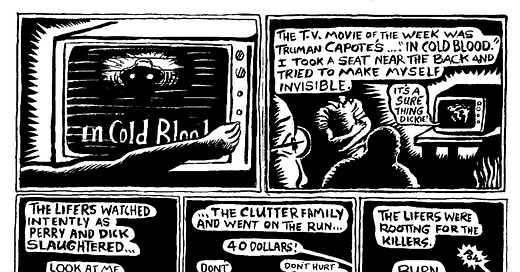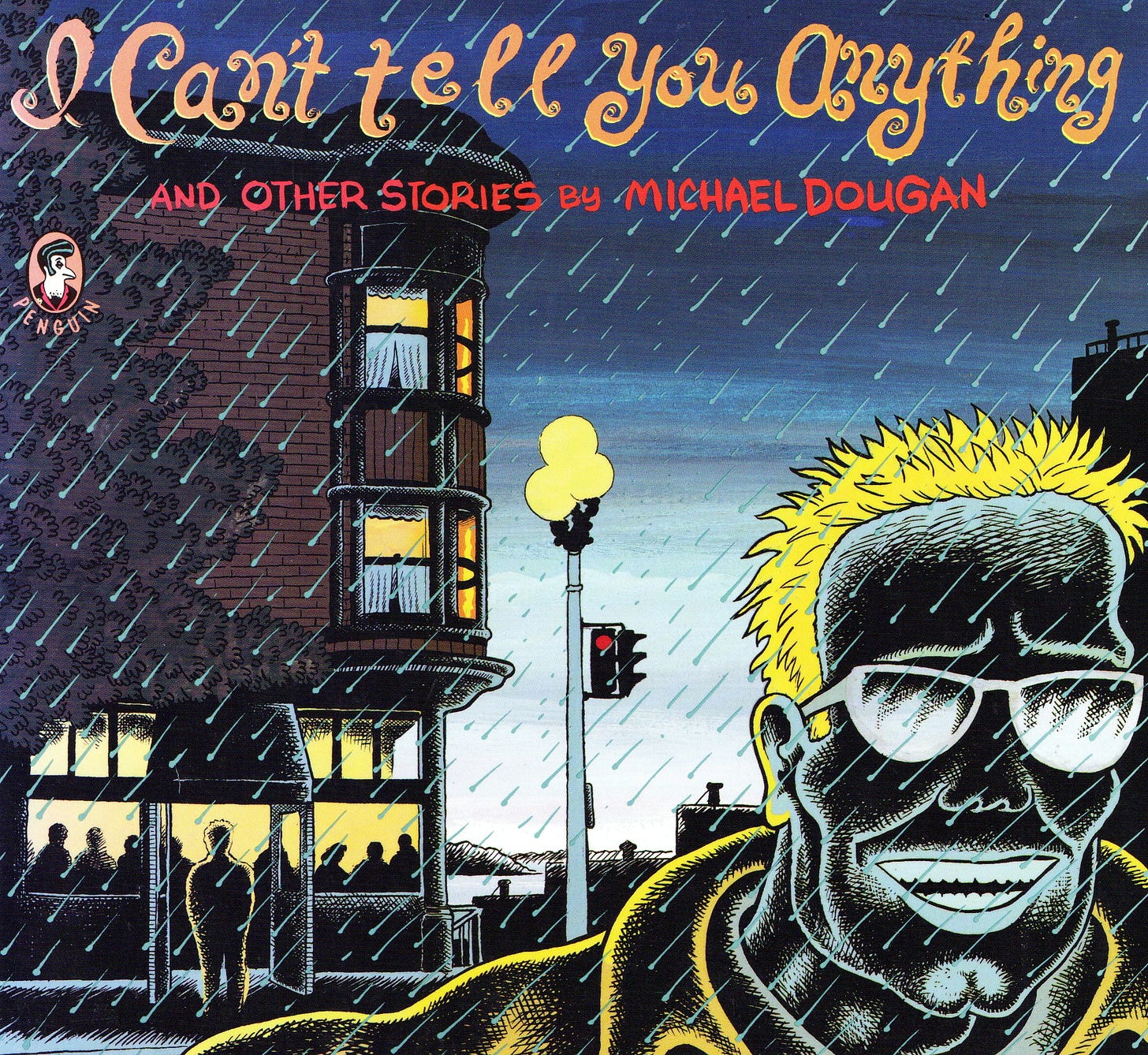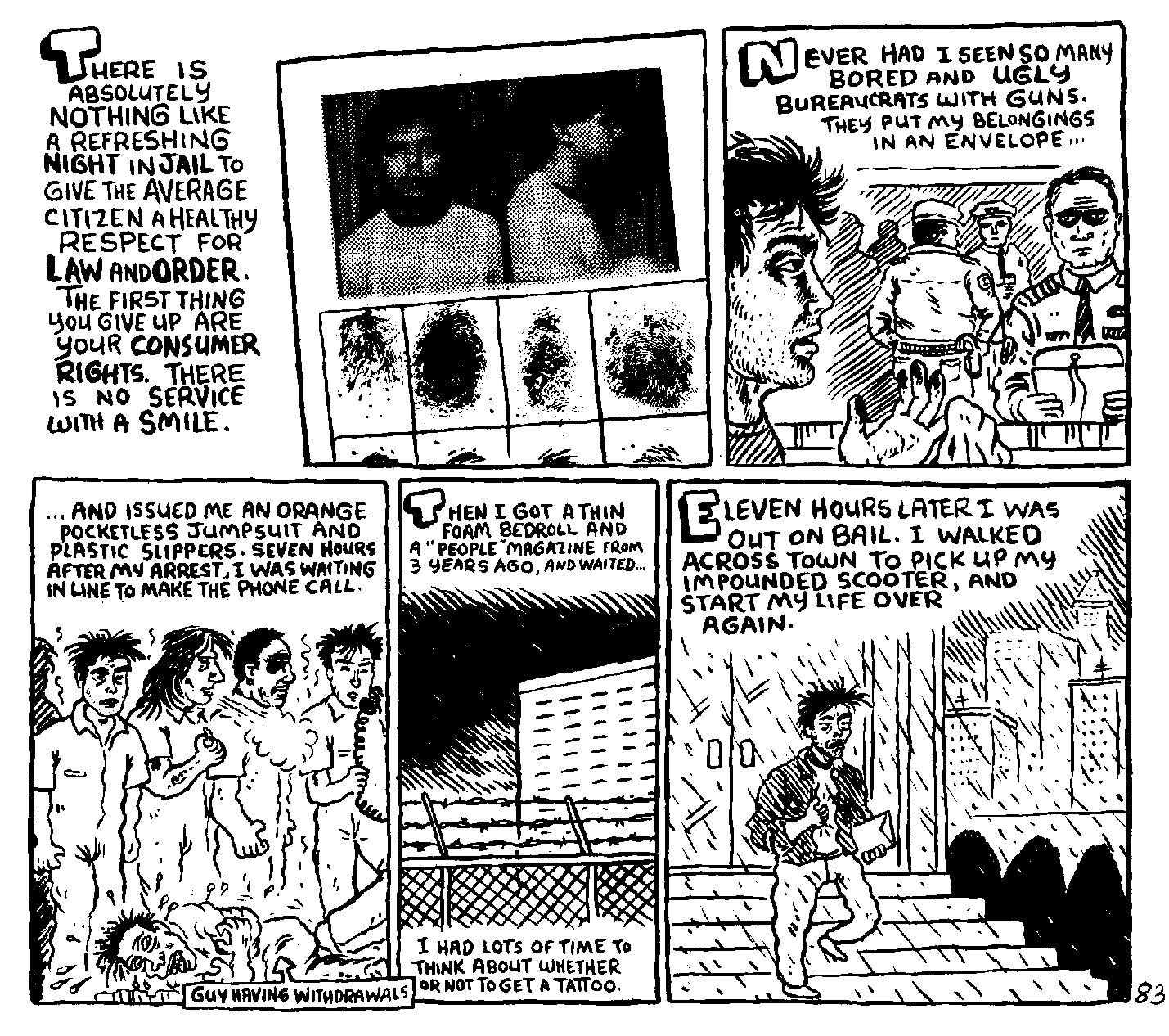I first became aware of Michael Dougan in the mid-80s from his work in Weirdo. The first story of his that I can remember was “Dennis the Sullen Menace”, written by Dennis P. Eicchorn. This issue (no. 19) was edited by Aline Kominsky-Crumb, who took over the editorship of the magazine after Peter Bagge moved on. Bagge had been the editor until issue 17, and his tastes still informed the contents of Weirdo. In addition to Michael Dougan and Dennis P. Eicchorn, Weirdo No, 19 had Mark Zingarelli and Bagge himself. Bagge knew all of the aforementioned cartoonists because they were all Seattle homers. Bagge got a bunch of his fellow Seattlites to contribute. Therefore, when I moved to Seattle in 1989, I got to know those guys, as well as other cartoonists from the region in Bagge’s artistic and social circle.
It was a good time to move to Seattle. Grunge was just about to take off, so the music scene was bubbling with lots of excitement. And the cartoonists whom Bagge had already befriended made for an already existing social/artistic scene to plug into. There were all these great Pacific Northwest cartoonists who never got the recognition that was due to them. Carel Moiseiwitsch from Vancouver, Eicchorn, Zingarelli, and Dougan from Seattle, and more.
Dougan published his first book with a small Seattle press called Real Comet Press. East Texas: Tales from Behind the Pine Curtain came out in 1988. It tells you a little about Dougan’s personal history—an early childhood spent in semirural East Texas before moving to Seattle as a teenager. I had a copy of this excellent book, but I must have misplaced it in a move.
In 1989, RAW (Art Spiegelman’s epochal art comics magazine) moved from self-publication to being published in a digest format by Penguin. Penguin, under Spiegelman’s influence, underwent a short, bright period of publishing art comics. One of the books they released as part of this brief publishing experiment was a volume of Michael Dougan stories called I Can’t Tell You Anything and Other Stories. Both East Texas and I Can’t Tell You Anything are out of print. You can only find Dougan work by buying back issues of Weirdo and digging up his out-of-print books. Dougan is an under-appreciated 80s master; this is tragic.
I have often wondered why Dougan didn’t become a better-known and better-loved cartoonist. Eric Reynolds, VP of Fantagraphics, wrote the following memory on Facebook:
His work is not as well remembered as it should be although his best book, I Can’t Tell You Anything, was released by Penguin in 1993 and still holds up as some of the best autobiographical work of its era. Part of Michael’s obscurity is because in 2006 a fire destroyed his house in Seattle, taking all of his art and archives — and in some ways his comics career — with it. He seemed to process what was a cartoonist’s Worst Case Scenario better than most could have, but it also seemed to fuel a desire to move forward rather than look backward. He spent a couple of years in LA writing for television. Whenever I brought up doing a collection of his work, he was interested but ultimately dismissed it as being too much of an “epic undertaking” to find the time for. I regret not pushing him harder but when he and his wife Chizuko moved to Tono, Japan circa 2018 and opened a coffee roasting business and café, we agreed to table the conversation until he felt more grounded over there.
Dougan died a few days ago.
Here are a few pages of his work that I loved:
“Let’s Get Lost” is part of a series of stories Dougan wrote about bad luck he had with cars and an other motor vehicles. “Where the Boys Are” is a memory of his childhood in East Texas and the boys his older sisters dated. And “Opportunity Jones” is about his unfulfilling life as a barrista in the early days of Starbucks. He envies those 80s master-of-the-universe types with their swagger and big hair.
Dougan was a great guy and I loved his work. I’m sorry he’s gone.
[Please consider supporting this publication by subscribing to it, by becoming a patron, and/or by patronizing our online store. And one more way to support this work is to buy books through The Great God Pan is Dead’s bookstore. ]








